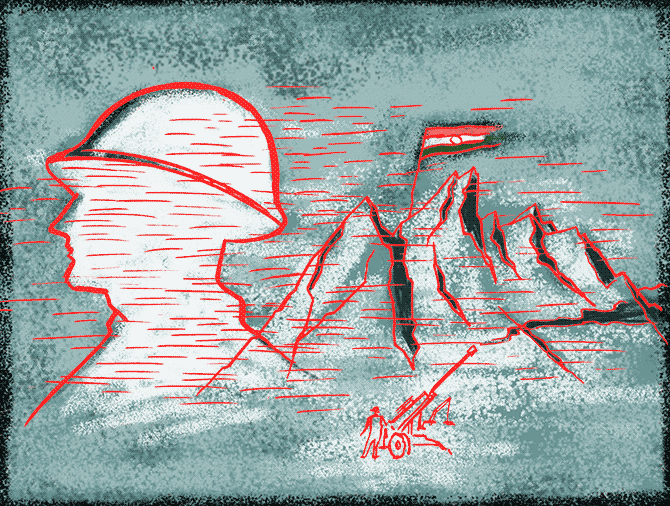'There will be no more lapses in vigil. Not for the men who will now have to guard these frozen heights.
'We now have to sit on these peaks all through the year, come winter, summer, rain or snow.'
On the occasion of Vijay Diwas, a Kargil Special.
Illustration: Dominic Xavier/Rediff.com

July 16
Is this war really over?
After 11 weeks of intense fighting in the most difficult of conditions, and against impossible odds, the mind is still not programmed to relax.
Most of us, officers and men, are still mentally on a battle high, where the senses are operating at levels never experienced before: every nerve is stretched, every sound magnified, every sinew alert to the slightest hint of danger.
The colonel who had flagged down our convoy at the Sonamarg checkpoint to warn us of the dangers ahead came around distributing sweets. "Congratulations, sir," he said, "the war is over. They have withdrawn. Finally, it's all over. We won."
For the first time in nearly three months, I lie down and stretch my weary legs. Every joint in my body is aching. I want, as do all the others, to sleep for days. But sleep will not come for a long time.
This is the legacy Operation Vijay has left us.
There will be no more lapses in vigil. Not for the men who will now have to guard these frozen heights.
I am to be one of them.
Right now, my mind is filled with thoughts of the dead. There have been so many.
Officers with whom, just the other day, I played cards with in the mess.
The JCOs and other ranks, the jawans who are bonded together as a unit.
I try and imagine what Lt Tilak Bannerjee's family must have gone through. He went missing on May 21 and his body was finally found today, July 16.
All those brave soldiers and fellow officers who are now being hailed as the Kargil martyrs. May they rest in peace.
For most of us, the sounds of battle still reverberate in our heads.
I find my hand often moving involuntarily to the radio set, to check my weapon, the ammunition.
This war will remain with us a long time.
I look around at my troops. They, like me, are sprawled out on the ground, faces turned to catch the warmth of the sun.
Even reclining, their bodies are tense, their eyes alert. They have learnt to be careful, to sit behind a boulder, expecting the shells to still come screaming in.
Just that morning, Major General Mohinder Puri had come around to each unit with words of caution. "Expect anything from them. They will be thirsting for revenge. Treat them like you would treat a wounded animal," he had said.
We know that only too well.
Suddenly, after a gap of 27 years, the Siachen Glacier -- the highest battlefield -- has extended itself to include an additional 150 km of the Kargil sector.
There can no longer be any complacency. Nor time for a bit of rest and recuperation.
Preparations have to be made to hold the heights through winter and that entails a huge task.
We now have to sit on these peaks all through the year, come winter, summer, rain or snow.
The question in all our minds, obviously, is: If we can do it now, why did we abandon them for the last so many years?
July 27
The price for ignoring the Kargil sector as a possible avenue of intrusion is being paid now.
We are eyeball to eyeball with their regular troops all along this newly created theatre of tension.
The Government of India and the ministry of defence will never admit to this, but even now, 10 days after the war is officially 'over', some Pakistani intruders still occupy some points on our side of the border.
Strategically, it does not offer them much advantage. But the fact remains that in Drass, opposite Point 5100, on a feature called Saddle, the Pakistanis are at least 800 yards into our territory and we can do little about it.
Much later, a plan to evict them is drawn up, but the government is not keen.
Ten days after the withdrawal was touted as being complete on July 17, the Pakistani army heli-dropped its troops close to this feature and opened up with their artillery guns.
Sixteen Grenadiers were there, in the process of firming up their hold on other vacated peaks at Saddle, when suddenly the shells started landing. They weren't really prepared.
The withdrawal had been completed and formalised and the Grenadiers were taken by surprise.
Caught in the open, the troops started running downhill, the shells chasing them as they scrambled down the slopes.
Total pandemonium had broken out.
Why were the Pakis firing again? Was the war not over?
That was one of the most tension-filled days of the entire battle for Brigadier Aul. Despite several attempts, he could not get through on radio to any officer.
He did, initially, manage to speak to Captain Uday, but he was hit by a shell and had to be evacuated (a feature on Saddle is now known as Uday Hill).
All that Brigade Headquarters knew was that a sudden attack had been launched, violating the ceasefire.
Aul wanted more details, but there was no contact.
All he knew was that there were several casualties.
All night, Aul had sat in his office at Brigade Headquarters trying to find out what was happening.
It was much later that Brigade learnt the truth: that the Pakistanis were still occupying Indian territory, and still are.
Plans for dislodging them were drawn up but for some inexplicable reason, they were called off.
Maybe because such a move was fraught with political danger.
What if that sparked off the battle once again?
It was perhaps a risk the caretaker government didn't want to take, not with elections round the corner.
Excerpted from A Soldier's Diary: Kargil, The Inside Story by Harinder Baweja, with the kind permission of the publishers, Roli Books.










